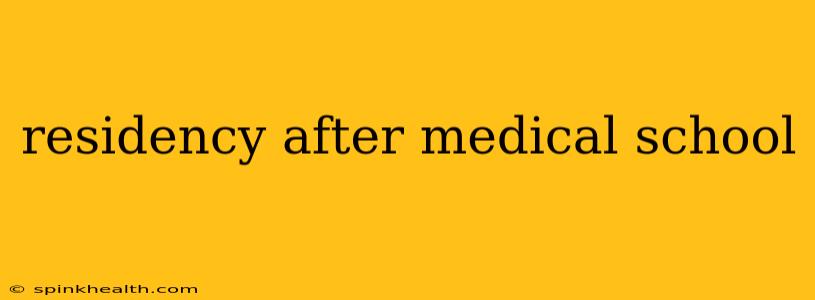The culmination of years of grueling study and relentless effort—medical school—finally arrives. But the journey doesn't end there; in fact, it's just beginning. For aspiring physicians, the next crucial step is securing a residency position. This period, often described as a "medical apprenticeship," is where the theoretical knowledge gained in medical school is translated into practical skills and real-world experience. It's a transformative time, demanding, rewarding, and ultimately shaping the future physician. This post will guide you through the complexities of applying for and succeeding in your residency.
What is a Residency?
A medical residency is a postgraduate training program for physicians. It's a structured period of supervised clinical practice, typically lasting three to seven years, depending on the chosen specialty. During residency, physicians work under the guidance of experienced attending physicians, gaining practical experience in diagnosing, treating, and managing patients. This hands-on experience is crucial for developing the competence and confidence needed for independent practice. Think of it as the final piece of the puzzle, transforming a medical school graduate into a qualified, practicing physician.
How Do I Apply for a Residency?
Applying for a residency is a highly competitive process. It requires meticulous planning, preparation, and unwavering dedication. The process begins long before graduation, often starting during the second or third year of medical school. Here's a breakdown:
1. The Match:
The National Resident Matching Program (NRMP) is the primary mechanism through which medical graduates in the United States secure residency positions. This centralized system allows applicants to rank their preferred programs, and programs rank applicants based on various criteria. The algorithm then matches applicants to programs based on mutual preferences.
2. USMLE Scores:
Your performance on the United States Medical Licensing Examination (USMLE) Steps 1, 2 CK, and 2 CS significantly influence your residency applications. High scores are highly valued by residency programs.
3. Medical School Performance:
Your academic record, including grades, research experience, and class rank, all contribute to your application's strength.
4. Letters of Recommendation:
Strong letters of recommendation from medical school faculty who can attest to your clinical skills, work ethic, and character are vital.
5. Personal Statement:
Your personal statement offers an opportunity to highlight your unique qualities, experiences, and aspirations. It’s your chance to tell your story and showcase your passion for medicine.
What Are the Different Residency Specialties?
The breadth of medical specialties is vast, encompassing various areas of expertise. Some popular choices include:
- Internal Medicine: Focusing on the diagnosis and treatment of adult diseases.
- Surgery: Involving surgical procedures and patient care related to various body systems.
- Pediatrics: Concentrating on the health of infants, children, and adolescents.
- Family Medicine: Providing comprehensive care for individuals and families of all ages.
- Obstetrics and Gynecology: Specializing in women's health.
- Psychiatry: Addressing mental health conditions.
Many subspecialties also exist within these broader fields, offering physicians further opportunities for specialization.
How Long Does a Residency Last?
The length of a residency varies significantly depending on the specialty. Generally, primary care residencies, such as Family Medicine and Internal Medicine, are three years. Surgical specialties often involve five to seven years of training.
What is the Difference Between a Fellowship and a Residency?
A fellowship is a post-residency training program for physicians who wish to specialize further within a specific area. Fellowships typically last one to three years. For instance, a physician who completes an Internal Medicine residency might pursue a cardiology fellowship.
How Competitive is Getting into a Residency Program?
The competition for desirable residency programs is fierce. Success requires strong academic credentials, compelling applications, and strategic planning.
How Much Do Residents Make?
Residency salaries vary by specialty, location, and the program itself. However, they generally offer a living wage, though it's important to remember the demanding nature of the training.
What Happens After a Residency?
After successfully completing a residency, physicians are eligible to practice medicine independently. Many choose to pursue further sub-specialization through fellowships, while others begin their careers in hospitals, clinics, or private practices. The journey is far from over; it's the start of a lifelong commitment to patient care and continuous learning. The rewards of this dedication, however, are immeasurable. The ability to make a tangible difference in people's lives, to provide comfort and healing, is the ultimate reward for any physician.

